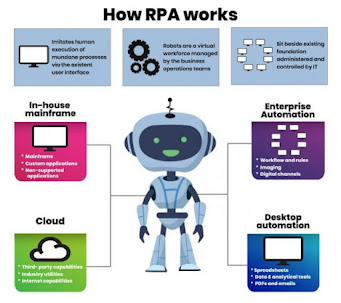An Introduction to Robotic Process Automation
In today's rapidly evolving business landscape, staying ahead of the curve often means embracing innovative technologies that can streamline operations, enhance productivity, and drive growth. One such technology that has been revolutionizing industries worldwide is Robotic Process Automation (RPA). In this blog, we'll take a closer look at what RPA is, how it works, and why it holds immense potential for businesses of all sizes.
What is RPA?
At its core, RPA refers to the use of software robots or "bots" to automate repetitive, rule-based tasks typically performed by humans. These tasks can range from data entry and processing to generating reports, reconciling accounts, and more. Unlike traditional automation solutions, which require complex integrations and coding, RPA operates on the user interface level, mimicking the actions of a human user interacting with software applications.
How Does RPA Work?
RPA software is designed to interact with existing applications and systems in the same way a human user would, but with greater speed, accuracy, and efficiency. These software robots can perform a wide range of tasks, including logging into applications, copying and pasting data, filling out forms, extracting information from documents, and even making decisions based on predefined rules or algorithms.
The key components of an RPA system include:
- Bot Creator: A tool used to develop and configure software robots.
- Bot Runner: The execution engine that runs the automated processes.
- Control Room: A centralized platform for managing, monitoring, and orchestrating bots.
- Bot Store: A marketplace for pre-built automation components and templates.
Why RPA Matters?
The adoption of RPA offers numerous benefits for organizations across industries, including:
- Cost Savings: By automating repetitive tasks, RPA reduces the need for manual intervention, resulting in lower labor costs and increased operational efficiency.
- Improved Accuracy: RPA eliminates the risk of human error associated with manual data entry and processing, leading to greater accuracy and data quality.
- Enhanced Scalability: RPA allows businesses to scale their operations quickly and cost-effectively by deploying additional bots as needed.
- Faster Time to Market: With RPA, organizations can accelerate their processes, reducing cycle times and time-to-market for products and services.
- Employee Empowerment: By automating mundane tasks, RPA frees up employees to focus on higher-value activities that require human judgment, creativity, and strategic thinking.
Conclusion
In summary, Robotic Process Automation represents a paradigm shift in how businesses approach process automation. By harnessing the power of software robots, organizations can achieve unprecedented levels of efficiency, productivity, and agility. Whether it's streamlining back-office operations, improving customer service, or driving digital transformation initiatives, RPA has the potential to unlock new possibilities and drive sustainable competitive advantage.
In the upcoming blogs in this series, we'll delve deeper into the various applications, challenges, best practices, and success stories surrounding RPA. Stay tuned to discover how RPA can revolutionize your business and propel it into the future.





This blog highlights the transformative impact of Robotic Process Automation (RPA) on businesses, emphasizing its ability to streamline processes, increase efficiency, and empower employees, ultimately driving sustainable competitive advantage.
ReplyDeleteGood Explanation
DeleteThis blog provides a fantastic introduction to Robotic Process Automation (RPA). The clear and concise explanation of RPA's functionality and benefits makes it accessible to both technical and non-technical readers. I'm particularly excited about the promise of increased efficiency and accuracy that RPA brings to businesses. Looking forward to the upcoming blogs in the series to delve deeper into practical applications and success stories
ReplyDeleteInteresting blog, It covered all the topics related to RPA are discussed in detail.
ReplyDelete